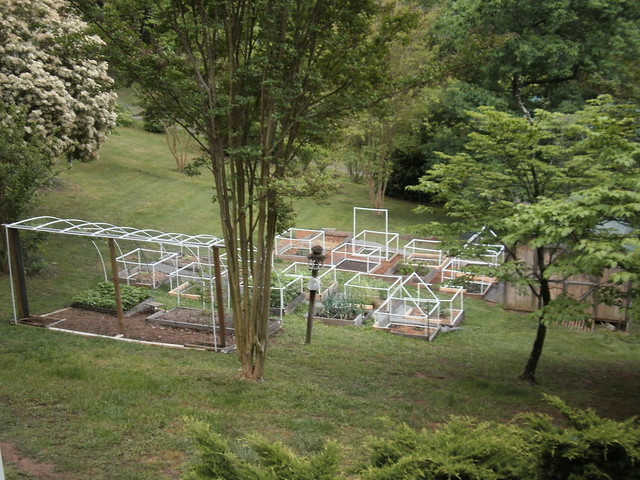I lay claim to the title Professional Writer because I make an income from selling my articles and books. I am also an amateur gardener: because I do NOT make any income from it. I had once considered selling excess produce at the local Farmers Market, but that would mean getting up quite early on Saturdays and trundling a truckload of veggies over to a parking lot where I would HOPE that people would be willing to exchange cash for foodstuffs. That lost its appeal once that ‘getting up early on Saturday’ thing became a tangible reality. Still I have learned some lessons from gardening that apply well to other areas of life, even life as a writer.
Lesson 1: Start Small
Garden patch or work of prose, diving into a monstrous work without experience will likely prove overwhelming and discouraging. Start small, with something you can manage and use that experience to grow into larger attempts. As you learn what works and what doesn’t, you can branch out and expand your effectiveness without suffering much loss through ineptness.
My garden started with four boxes sunk into the mountain slope so the loose soil didn’t wash away with every rain. I’m up to 20-some-odd boxes now. I expanded as I learned proper technique and became confident in my ability to maintain it all. My writing started out with short pieces – a few hundred words each – used as filler by newspapers and magazines. I’ve worked up to full length feature articles, some short fiction, and have published 3 books. Had I tried a novel right at the dawn of my career I’d probably have become very discouraged and gone back to computer programming.
Lesson 2: Plan Ahead
Ripping out a lot of what you’ve done because you ended up with a tangled mess or because the eggplants ended up in the shadow of tomato bushes wastes time, effort and resources. Do a little research; get an idea of what the matured project will look like before cultivating the seeds.
Pantsing your way through a 100,000 word novel will probably mean ripping out and re-writing stuff. Having at least a basic outline of events will help avoid writing yourself into a corner.
Lesson 3: Avoid Temptation
Falling for seed catalog descriptions of wonderfulness and planting things your family won’t eat is a waste of space and effort, especially if you freeze or can them only to sit untouched for years. Writing articles or books that are currently hot topics but in which you lack experience will likely mean publishers (and readers) will have no interest in them once completed.
Lesson 4: Watch for Weeds
Weeds suck nutrients from the soil and crowd out your crops. Blocks of text that you find wonderfully clever but don’t add to your story have no place in it. As painful as it is, yank them out and keep it vital and thriving.
Lesson 5: Focus On the Most Valuable
A lesson I learned from fellow gardening enthusiast and author Deborah Lee Luskin[1] – that I have not yet mastered myself — is to focus your efforts on the most valuable pursuits. She advises buying the inexpensive, plentiful items, like potatoes and onions, from a farmers market and focusing your own space on expensive and difficult to find items, like culinary herbs. As a writer, focusing on writing your stories and buying ancillary items like cover design and editing will make the best use of your time – and often produce a better yield.
I myself am still stuck in “survivalist mode” attempting to grow all my own produce, and self-publishing my books. One day, I hope to become sufficiently enlightened (and fiscally capable) to follow her advice. For the moment, it’s just me, a patch of dirt, and a laptop.



Great comparison of writing to gardening. I’ve bookmarked this post.
Thank you, Sandra.
This is really an interesting article, Allan. I can relate to it on so many levels. For example, I’m starting my New Year’s resolutions rather late in the year (!!) and they include running. So this morning I got my track suit on, my yoga pants and runner’s jacket and water bottle, and ran/walked for 20 minutes or 2100 steps. That’s starting small. I’ll gladly pay someone else to rent me a bicycle so I don’t have to buy one, and to train me for my next half marathon. Same with healthy eating, what I can’t cook myself I’ll buy from an organic or health food store, pricey, but I can’t do everything myself. I presently pay for an editor but find Beta readers who will do the job for nothing or at most a free book. I pay to belong to two writer’s groups and have made the most fantastic connections at a weekend conference, and also free access to a Writer’s Circle and a Writer in Residence who will critique my manuscripts for nothing. I’m a Canadian. The group is called Canadian Authors Association and also I belong to the Writers’ Guild of Alberta. Both are pricey for my limited pocketbook but worth it, as I write. Have a book traditionally published and another accepted. You write very well, Allan, you should be proud of your blog, I enjoy it very much, and you have a bright and inquiring mind.
Thank you, Kenna, for the kind words and for the feedback/ideas. Great ideas for others to look into for budget conscious authors needing editorial and development help. I wish there were some writers groups around here. There is one… a romance writers group… NOT my thing for sure. 🙂